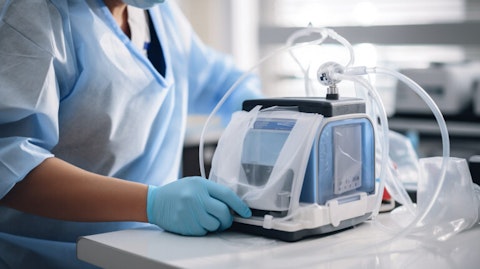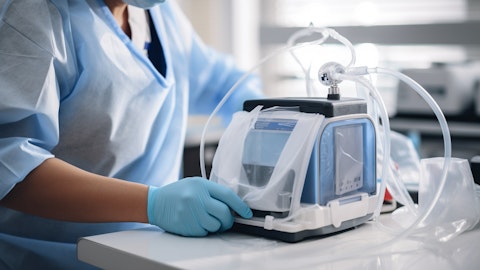We came across a bearish thesis on Inogen, Inc. (INGN) on Substack by The Nexus Files. In this article, we will summarize the bears’ thesis on INGN. Inogen, Inc. (INGN)’s share was trading at $9.57 as of Nov 6th. INGN’s trailing P/E was 98.76 according to Yahoo Finance.

A close-up of a medical technician wearing lab coat and a face mask preparing a portable oxygen concentrator for a patient.
Inogen, a company that sells lightweight oxygen concentrators for patients, has recently come under scrutiny due to safety concerns about its products. While oxygen concentrators are vital medical devices, there have been numerous incidents involving Inogen’s products that raise significant alarms. The FDA has previously recalled similar products from other companies over even mild complaints, but Inogen’s track record appears much more concerning. Since 2020, there have been 111 adverse event reports filed against Inogen’s devices, which include reports of malfunction, patient injuries, and even fatalities. The list of incidents includes oxygen concentrators that stopped delivering adequate oxygen, defective units that led to patients losing consciousness and even explosions caused by oxygen leaks and product defects. Among the most troubling are the cases of fires and explosions linked to Inogen’s products, where oxygen leaks and moisture issues led to dangerous malfunctions, endangering lives.
The frequency of these issues has raised red flags, especially considering the severe consequences for patients who rely on these devices for survival. Inogen’s concentrators have been associated with 69 reported malfunctions, which include incorrect battery readings, shut-offs, and oxygen flow interruptions. In total, 44 injuries have been reported, along with two deaths in 2024 alone. These issues have prompted critics to question the company’s commitment to patient safety and whether it is prioritizing profits over the well-being of its users. Inogen has avoided a recall, despite the volume of complaints, which may be a strategic decision to protect its financial interests. The company’s stock price has risen significantly over the past few months, but this increase is unwarranted given the growing number of safety concerns.
Further scrutiny comes from activist short-sellers like Muddy Waters, who have accused Inogen of inflating its total addressable market (TAM) to boost its stock price. Muddy’s 2019 report highlighted how Inogen exaggerated the potential market for its products, painting a picture of rapid growth that misled investors. This came just before the stock price plummeted by 94%, vindicating Muddy’s claims. Critics argue that the company is using similar tactics today, focusing on stock price manipulation rather than ensuring product safety.
Inogen’s oxygen concentrators were approved through the FDA’s 510(k) fast-track process, which only requires proving that the product is similar to an existing device. However, Inogen’s products have significantly more safety complaints than the devices they were compared to, raising concerns about the adequacy of the approval process. Despite the severe issues surrounding its devices, Inogen has yet to take meaningful action to address these problems, leaving patient safety at risk. The growing number of adverse reports indicates that Inogen is failing to meet industry standards, and its management appears more focused on protecting its financial interests than ensuring the safety of its customers.
The bearish thesis on Inogen is based on significant safety concerns with its oxygen concentrators, including malfunctions, fires, injuries, and even deaths. Despite these issues, Inogen has not faced a recall, raising questions about its ethical practices and poor safety record further undermining investor confidence.
Please keep in mind that these aren’t Insider Monkey’s opinions, and we merely summarized the bears’ thesis in this article.
Inogen, Inc. (INGN) is not on our list of the 31 Most Popular Stocks Among Hedge Funds. As per our database, 19 hedge fund portfolios held INGN at the end of the second quarter which was 21 in the previous quarter. While we acknowledge the risk and potential of INGN as an investment, our conviction lies in the belief that some AI stocks hold greater promise for delivering higher returns, and doing so within a shorter timeframe. If you are looking for an AI stock that is more promising than INGN but that trades at less than 5 times its earnings, check out our report about the cheapest AI stock.
READ NEXT: 8 Best Wide Moat Stocks to Buy Now and 30 Most Important AI Stocks According to BlackRock.
Disclosure: None. This article was originally published at Insider Monkey.


